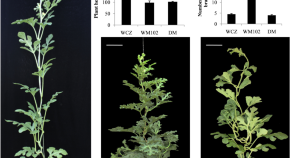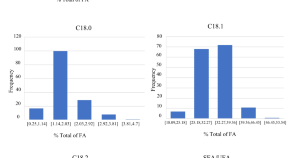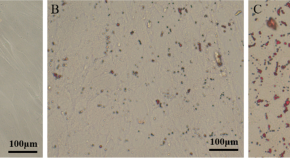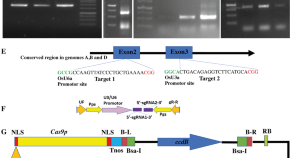Construction and application of a new watermelon germplasm with the phenotype of dwarf and branchless
Authors (first, second and last of 11)

Collection
The global human population is expected to increase from 6.7 billion to 9 billion by the year 2050. To meet the growing food demands, word agricultural production is necessary to raise by 50% by 2030. The cultivable land is limited d is continuously being lost to urbanization, salinization, desertification, and environmental degradation therefore, relying to reclaim undeveloped land for agricultural purposes is less useful. Keeping in view, we can make genetic improvement of agricultural crops to adapt better under increasing temperatures, drought and flooding, rising salinity, and changing pathogen and insect threats under global climate change conditions. Under such circumstances, there is utmost requirement to unlock the repository of genetic basis and extensive utilization of germplasm to develop “Climate Resilient Cultivars” through the application of genomics based tools, approaches and novel knowledge based on break through research from the past few decades.
It’s noteworthy that modern molecular breeding techniques and other emerging plant breeding based technologies have contributed considerably for food and nutritional security. Therefore, novel plant breeding techniques (NPBTs) are urgently needed to enable sustainable agriculture; including new strategies to develop varieties and crops that have high yield potential, high yield stability, and superior grain quality and nutrition; nevertheless, less consumption of water, fertilizer, and chemicals should also be considered for environmental protection. Recently, OMICs, genome-wide association study (GWAS) and genome editing approaches have proven themselves as powerful tools that we have at our disposal to overcome substantial obstacles in the way of efficiency and productivity of current agricultural practices. The convergence of OMICs based techniques and GWAS has provided with high-quality genomes, re-sequencing data from thousands of genotypes, extensive transcriptome sequencing, development of haplotype map and web-based functional databases accelerated the identification of genes underlying important attributes relevant to food production and quality. In addition, genome editing techniques (CRISPR/Cas9 (Clustered Regularly Interspaced Short Palindromic Repeats/CRISPR-associated systems), CRISPR/Cas12a (Cpf1, CRISPR from Prevotella and Francisella 1), and Cas9-derived DNA base editors and prime editors), provide an unprecedented advancement in genome engineering due to precise DNA manipulation. The objective of compilation is to highlight the development and adoption of novel cutting edge techniques in plant sciences and to further enhance the understating for OMICs, GWAS and genome editing along with recent developments for regulatory measures for genome edit crops.
In this Research Topic, we will focus on the recent advances made in the development of novel tools and techniques used for the development of traits of interest in domesticated crops especially cereals helping to achieve zero hunger. Moreover, the advancements in CRISPR techniques and their applications in crop improvement programs and functional genomics studies.
Keywords: QTL mapping; CRISPR/Cas9; Multi-omics; SNPs; Genomic databases; Nanotechnology; Stress Breeding; Precision breeding; Crop Improvement.
Scope of the Research Topic:
• Recent trends in plant breeding approaches • Marker assisted selection • Crop domestication • Modern techniques for crop improvement • QTL mapping for various plant traits • Recent trends in genetics and genomics of crop plants • Hybrid seed production via classical and modern techniques • Speed Breeding • Genomic selection • Breeding approaches for root traits improvement • Identification and characterization of genes controlling biotic and abiotic stresses in crops • Genome wide association mapping for genes controlling economically important traits • CRISPR/Cas system for crop improvement • Recent developments in CRISPR/Cas system and their application
Department of Plant Breeding and Genetics, The University of Haripur 22620, Pakistan Email: sfiaz@uoh.edu.pk
Department of Biochemistry, College of Science, King Saud University, P.O. Box 2455, Riyadh 11451, Saudi Arabia Email: kattia1.c@ksu.edu.sa


























